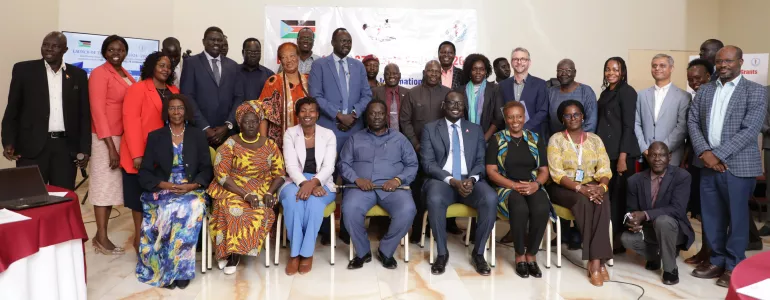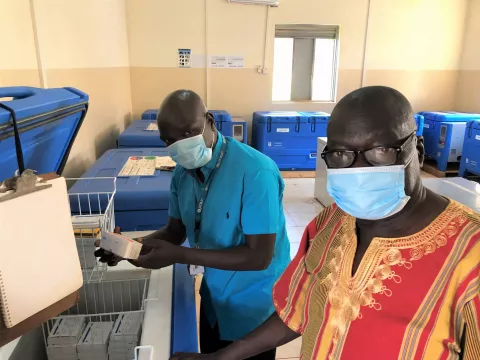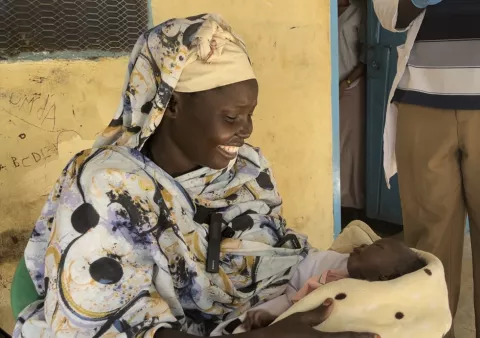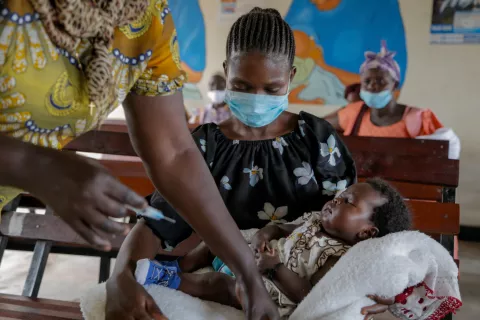Government, Global Fund, UNDP, UNICEF and Partners Renew Partnership to Strengthen HIV, Tuberculosis and Malaria Response in South Sudan

Juba – South Sudan, Thursday February 15th, 2024 – The Government of South Sudan, with funding from the Global Fund to Fight AIDS, Tuberculosis (TB) and Malaria (the Global Fund), and in partnership with the United Nations Development Programme (UNDP) and UNICEF have launched the seventh Grant Cycle (GC7) to consolidate gains and strengthen the national response to HIV, tuberculosis (TB) and malaria in South Sudan from 2024-2026. The new grant was launched by the Vice President and Chair of the Service Cluster H.E Hussein Abdelbagi Akol accompanied by Honourable Yolanda Awel Deng, the Minister of Health on Wednesday, February 14th, 2024, at Pyramid Hotel, in Juba.
Valued at US$167 million, the contribution is comprised of $ 50.2 million for HIV, $ 17 million for TB, $ 23.5 million for Resilient and Sustainable Systems for Health (RSSH), $53.3 for malaria, and $23 million for pandemic preparedness and additional RSSH. This is the largest Global Fund contribution to the people of South Sudan since its independence in 2011. This grant supports the country’s vision of ending AIDS, TB and malaria as public health threats by 2030, seeks to build resilient and sustainable health systems, strengthen pandemic preparedness and promote national, multi-sectoral response to health and health risks.
As the Principal Recipient for the HIV, TB, RSSH and C19RM components, UNDP, on behalf of the Government and its partners, will manage a total of US$116.3 million which is also the highest amount under UNDP’s stewardship in recent periods. UNICEF will manage the component for malaria valued at
$53.3 million. Malaria transmission in South Sudan is high with the 2017 Malaria Indicator Survey putting the parasite prevalence at 32% up from 28% in 2013. Because of the high transmission and limited coverage of prevention interventions, malaria case management is key to averting preventable loss of lives particularly for the most vulnerable populations such as women and children.
These components of the grant build on the achievements made through previous periods of Global Fund support. These include strengthening health systems, as well as the procurement, storage and distribution of HIV, TB, COVID-19 and laboratory reagents and health supplies which has ensured access to vital medicines and therapeutics in over 200 hospitals and health facilities across the country. Building on these gains, the new grant seeks to reach 78,000 people living with HIV with lifesaving medication, treating and curing 22,000 people affected by TB per year and equipping over 28 hospitals and health facilities with solar power installations, as well as providing a secure and reliable supply of medical oxygen country wide.
Additionally, the new grant seeks to reduce new HIV infections by 25% by 2026, reduce AIDS-related deaths by 25% by 2026, maintain above 70% coverage of combination HIV prevention interventions for key and vulnerable populations, reach 85% of HIV+ pregnant women by 2026, reach 3,000 of HIV-Exposed Infants (HEI) with early Infant Diagnosis (EID) by 2026 and reduce HIV-related discrimination and other inequalities towards People Living with HIV/AIDS.
Others are increasing targets for the ‘first 95’ (people who are living with HIV knowing their HIV status) to 85,000 by 2026, increase the ‘second 95’ (people who know that they are living with HIV receiving ART) to 75,000 by 2026 and maintain the ‘third 95’ (people who are on treatment being virally suppressed) above 85% by 2026.
The oversight of the grant will be undertaken by the Country Coordinating Mechanism (CCM), a multisectoral body which oversees the implementation of the Global Fund programme in the country. Dr. Jane Alphonse, the CCM Chairperson says that the grant will improve the humanitarian situation in the country and ensure that people access vital health services.
“Despite the longest spell of relative stability in recent years, South Sudan is still grappling with dire humanitarian challenges, with more and more people in need of essential AIDS, TB and malaria services. This grant will not only save lives, but it will alleviate people's suffering and improve their health and wellbeing,” said Dr. Jane Alphonse, adding that,
“Coming in wake of increasing disease burdens, economic disruptions, and growing public health threats, this grant will enable us to extend HIV, TB and malaria services to more vulnerable population segments, especially in remote areas.”
On his part, the Programme Coordination Advisor for the UNDP Global Fund Programme Mr. Russell Armstrong thanked the Government, the Global Fund, and partners for the renewed confidence in UNDP as a partner of choice for the stewardship of precious Global Fund resources on behalf of the people of South Sudan and pledged UNDP’s commitment to deliver on the aspirations of GC7.
“We have a tremendous opportunity in the next three years to achieve impact for the people of South Sudan and to bring everyone many steps closer to once and for all ending HIV, TB and malaria as public health burdens for the country,” said Mr. Armstrong.
Hamida Lasseko, UNICEF Representative, welcomed the grant and credited the Government and partners for their commitment to the health of children in the country. “Malaria ranks among the top three causes of child mortality in South Sudan, and it is estimated to account for a high proportion of consultations, admissions, and deaths in children,” she said. “Improving access to quality services through strengthening facility-based diagnosis and treatment, integrating community case management of malaria, strengthening laboratory diagnosis, conducting therapeutic efficacy studies, and social behavior change communication is key to fighting malaria in South Sudan.”
Media contacts
About UNICEF
UNICEF promotes the rights and wellbeing of every child, in everything we do. Together with our partners, we work in 190 countries and territories to translate that commitment into practical action, focusing special effort on reaching the most vulnerable and excluded children, to the benefit of all children, everywhere.
For more information about UNICEF and its work in South Sudan visit: www.unicef.org/southsudan
Follow UNICEF South Sudan on Twitter, Facebook, Instagram and YouTube




